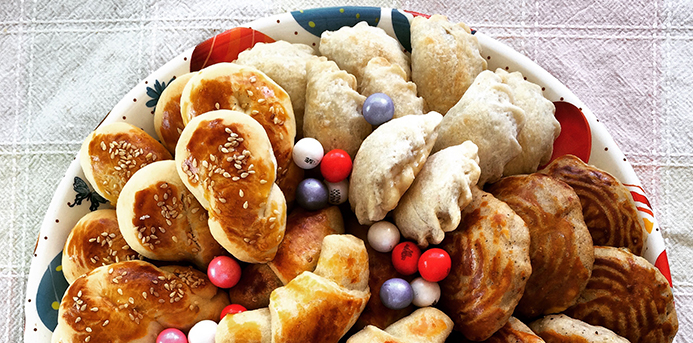Born and raised in Damascus, Syria, the oldest city in the world, sisters Rana and Siham Jebran received their green cards in 2007 and started making regular visits to family in Chicago. Now, they’re the guiding force behind — and source of recipes for — Honeydoe, a catering service “founded to bring delicious Syrian dishes to Chicago.”
We met Rana’s son, Anwar, at Chicago’s Strange Food Festival in late 2016; the food he was serving was by no means “strange,” mostly pastries and cookies. Through Honeydoe, the Jebran family also serves easily recognizable Middle Eastern favorites including kibbeh, spinach pie and stuffed grape leaves, all foods familiar to anyone who lives in multi-cultural Chicago. Such foods speak a special language, however, to Syrians and other Middle Eastern people who have settled in Chicago. The act of preparing, serving and eating these foods is a way to connect with a culture they left behind, sometimes under most unfortunate circumstances, and it’s also a way to build a bridge with native-born Chicagoans who may be as unfamiliar with Syrian food as they are with Syria itself.
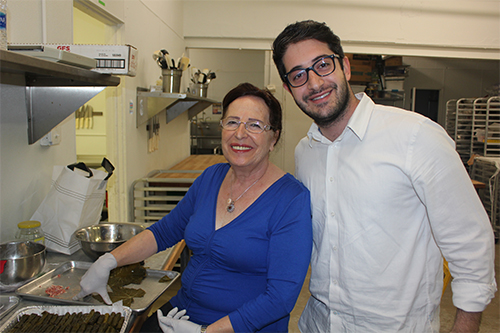
Seeking Peace … and a Job
During the Obama years, it was announced in the National Report that Dearborn, Michigan, had been placed under Sharia law. According to the article, the Dearborn city council “voted 4-3 to become the first US city to officially implement all aspects of Sharia Law. The tough new law, slated to go into effect January 1st, addresses secular law including crime, politics and economics as well as personal matters such as sexual intercourse, fasting, prayer, diet and hygiene.”
As it turns out, National Report is a satire site, and though the Dearborn-under-Sharia-law story was complete baloney, it was soon repeated as fact in the Conservative Tribune, Human Events and several other publications that apparently rely on editors who don’t fact check and readers who lack critical thinking skills.
Dearborn has never been under Sharia law, of course, but the alternative facts presented in the conservative press may have gained credibility because Dearborn does have the country’s greatest concentration of Arab Americans. Many of those people came to Dearborn in search of jobs. Not long ago, Ford’s River Rouge plant was hiring big time. The more recent reason so many Arabic people have started flowing into Dearborn is that war is a daily reality in much of the Arab world.
Arriving in the U.S., the new immigrants to Dearborn prepare the foods of their homelands not only to provide comfort to fellow immigrants, but to create connections to Americans, like us, who are eager to discover what Syrians and other Arab-Americans like to eat.
Dearborn’s Arab-American National Museum runs a series of culinary walking tours called YallaEats in various Dearborn neighborhoods. We found these reasonably priced tours to be a delicious introduction to the range of Middle Eastern foods available in Dearborn.
Matt Stiffler, research and content director at the museum, told us, “In an enclave like Dearborn, it’s probably a little easier to open restaurants, because children, cousins, uncles will help. In Dearborn, there’s also a lot of vertical integration because you know the person who has the produce, you know the butcher, you know the person who’s importing the stuff, so it actually makes it a little easier to run a restaurant, because it could be your cousin who’s the butcher, and the other cousin is an importer.”
The immigrants-helping-immigrants dynamic that Stiffler describes came into play at Honeydoe: The Jebran family purchases spices from Ziyad Brothers Importing, a major distributor of Middle Eastern food products that was originally called Syrian Bakery & Grocery Inc.
In a big city like Chicago, of course, there are many people helping Syrians find the foods of their homeland and make Chicago their home.
Local Families Welcome Syrian Neighbors
Seth Zurer is a local food enthusiast and co-founder of Baconfest, an annual celebration of pork belly that has contributed many hundreds of thousands of dollars to the Greater Chicago Food Depository. Now, Zurer, his wife, Kerensa Peterson, and others are working with RefugeeOne, a 2014 Make It Better Philanthropy Award winner, “to welcome and reunite refugees fleeing war, terror, and persecution from around the globe.”
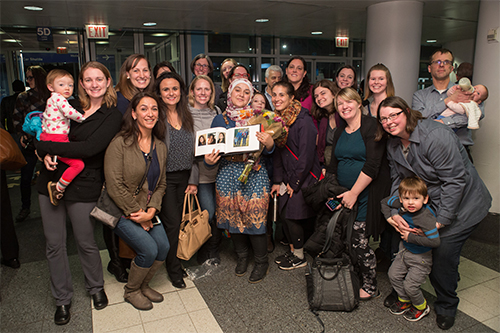
We asked Zurer about his motivation for joining this effort; he answered: “Donald Trump. After the election, we felt very motivated to find ways to lend support to organizations that were working to affect change on issues that we care about and that we were more acutely worried about under a Trump administration.”
RefugeeOne has developed a system to prepare the way for new arrivals and to work with them during their first year in the U.S. RefugeeOne locates apartments for the families, which Zurer explains is “not always an easy task, as landlords are reluctant to rent to families with no income, no English, no employment and (often) no credit history.” The family has to buy furniture and pay rent and utility for the first few months; Zurer and his group buy groceries and other essentials. Overall, explains Zurer, he and his group “answer questions and find solutions to the myriad problems that come with showing up in a new country after leaving behind home, family, and all the familiar vestiges of life while trying to escape from the strife of the Syrian civil war.”
Food, of course, helps in the transition, as Zurer explains, “There’s a lot that’s unfamiliar when a new family arrives in Chicago — refugee or not! We want to make sure that they have access to familiar food and that they know where to go to get more provisions as they become more independent.”
Land of Opportunity
Coming to Chicago and starting Honeydoe, “It was one of my goals,” says Anwar, “to support the Syrian people in Chicago. They need help integrating into Chicago. The refugee organization will help them but only for a period of time, and then they’re on their own. If they don’t find a job as soon as possible, they won’t be able to pay for rent and food.”
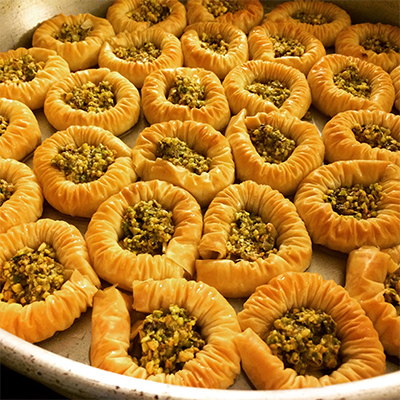
Two people who have been helped by Anwar and Honeydoe are women we’ll call Anna and Betty.
Anna had been working in a barbershop in the Damascus suburbs. When conflict broke out, she and her family flew to Jordan and then Egypt, where many Syrians were opening restaurants. Anna worked in a Syrian restaurant in Egypt, gaining experience in the kitchen. “When the U.N. was able to bring them to this country, about two years ago,” says Anwar, “she came to Chicago. She and her family are living on Devon. We work with Syrian Community Network, and they do a lot to help refugees. Anna came to a SCN job fair, and that’s how we met. Currently, Anna’s daughter is learning English at Truman College: Her dream is to pursue a pharmacy degree.”
Betty was from Aleppo before she went to Turkey, where she waited years for the paperwork to be completed, hoping the U.N. would choose them to come to the States. “All Syrians who flee to another country,” explains Anwar, “get refugee status and then they’re put on the register by the U.N., which chooses a place for them to go based on a country’s capacity. A lot of people went to Germany and Scandinavia.” Anwar also met Betty at the job fair; she was very good with kibbeh, which happens to be Anwar’s favorite food. She was hired. Her kibbeh is now the best-selling food from Honeydoe.
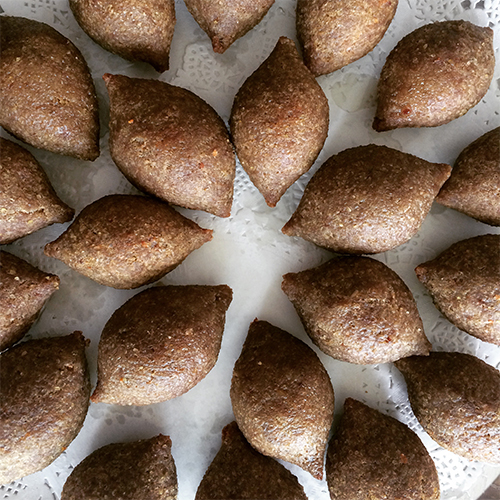
Anwar himself is pursuing his future in this country; he graduated from medical school in 2014, and now he’s doing his residency in Internal Medicine at Weiss Memorial. “My dad is coming soon. He’s in Damascus. He’s a U.S. citizen, but he goes back and forth. He’s working with an international organization, Caritas, which helps displaced people in Damascus with food and shelter.”
With the spirit of giving running in the family, Anwar, Rana and Siham Jebran are doing more through Honeydoe than just providing good food to Syrians and others. They’re finding jobs for Syrians, and helping them integrate into the larger American community. Just as importantly, they’re educating all of us who were born in this country. To taste the food of a different culture is to begin to understand that culture. You find that the flavors you like are also the flavors enjoyed by people on the other side of the planet, and by tasting their food, you come to know them.
More from Make It Better:
- 16 of the Best Chicago Rooftop Bars and Restaurants
- Chef Andrew Zimmerman Introduces Global Street Food at Proxi
- Mezcal’s Moment: Why This Mexican Spirit Is Booming — and You Should Sip It While You Can

David Hammond is Dining and Drinking Editor at Newcity and contributes to the Chicago Tribune and other publications. In 2004, he co-founded LTHForum.com, the 15,000 member food chat site; for several years he wrote weekly “Food Detective” columns in the Chicago Sun-Times; he writes weekly food columns for Wednesday Journal. He has written extensively about the culinary traditions of Mexico and Southeast Asia and contributed several chapters to “Street Food Around the World.”
